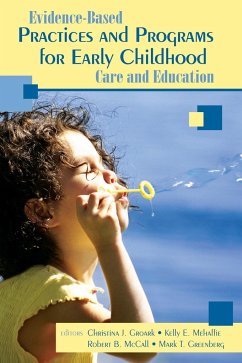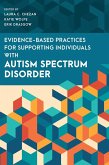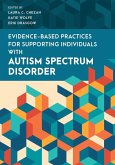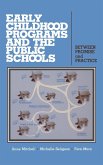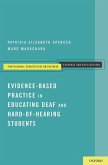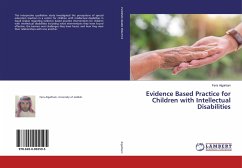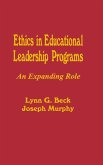Christina J. Groark, Kelly E. Mehaffie, Robert B. McCall
Evidence-Based Practices and Programs for Early Childhood Care and Education
Christina J. Groark, Kelly E. Mehaffie, Robert B. McCall
Evidence-Based Practices and Programs for Early Childhood Care and Education
- Gebundenes Buch
- Merkliste
- Auf die Merkliste
- Bewerten Bewerten
- Teilen
- Produkt teilen
- Produkterinnerung
- Produkterinnerung
This timely handbook presents evidence and recommendations to make informed decisions for planning, funding, and operating high-quality educational programs for children ages 3-8.
Andere Kunden interessierten sich auch für
![Evidence-Based Practices for Supporting Individuals with Autism Spectrum Disorder Evidence-Based Practices for Supporting Individuals with Autism Spectrum Disorder]() Evidence-Based Practices for Supporting Individuals with Autism Spectrum Disorder133,99 €
Evidence-Based Practices for Supporting Individuals with Autism Spectrum Disorder133,99 €![Evidence-Based Practices for Supporting Individuals with Autism Spectrum Disorder Evidence-Based Practices for Supporting Individuals with Autism Spectrum Disorder]() Evidence-Based Practices for Supporting Individuals with Autism Spectrum Disorder48,99 €
Evidence-Based Practices for Supporting Individuals with Autism Spectrum Disorder48,99 €![Early Childhood Programs and the Public Schools Early Childhood Programs and the Public Schools]() Michelle SeligsonEarly Childhood Programs and the Public Schools105,99 €
Michelle SeligsonEarly Childhood Programs and the Public Schools105,99 €![Evidence-Based Treatment of Stuttering Evidence-Based Treatment of Stuttering]() Evidence-Based Treatment of Stuttering77,99 €
Evidence-Based Treatment of Stuttering77,99 €![Evidence-Based Practice in Educating Deaf and Hard-Of-Hearing Students Evidence-Based Practice in Educating Deaf and Hard-Of-Hearing Students]() Patricia Elizabeth SpencerEvidence-Based Practice in Educating Deaf and Hard-Of-Hearing Students58,99 €
Patricia Elizabeth SpencerEvidence-Based Practice in Educating Deaf and Hard-Of-Hearing Students58,99 €![Evidence Based Practice for Children with Intellectual Disabilities Evidence Based Practice for Children with Intellectual Disabilities]() Faris AlgahtaniEvidence Based Practice for Children with Intellectual Disabilities62,99 €
Faris AlgahtaniEvidence Based Practice for Children with Intellectual Disabilities62,99 €![Ethics in Educational Leadership Programs Ethics in Educational Leadership Programs]() Lynn G. BeckEthics in Educational Leadership Programs57,99 €
Lynn G. BeckEthics in Educational Leadership Programs57,99 €-
-
-
This timely handbook presents evidence and recommendations to make informed decisions for planning, funding, and operating high-quality educational programs for children ages 3-8.
Hinweis: Dieser Artikel kann nur an eine deutsche Lieferadresse ausgeliefert werden.
Hinweis: Dieser Artikel kann nur an eine deutsche Lieferadresse ausgeliefert werden.
Produktdetails
- Produktdetails
- Verlag: Corwin
- Seitenzahl: 218
- Erscheinungstermin: 14. Juli 2006
- Englisch
- Abmessung: 260mm x 183mm x 16mm
- Gewicht: 614g
- ISBN-13: 9781412926140
- ISBN-10: 1412926149
- Artikelnr.: 21182014
- Herstellerkennzeichnung
- Produktsicherheitsverantwortliche/r
- Europaallee 1
- 36244 Bad Hersfeld
- gpsr@libri.de
- Verlag: Corwin
- Seitenzahl: 218
- Erscheinungstermin: 14. Juli 2006
- Englisch
- Abmessung: 260mm x 183mm x 16mm
- Gewicht: 614g
- ISBN-13: 9781412926140
- ISBN-10: 1412926149
- Artikelnr.: 21182014
- Herstellerkennzeichnung
- Produktsicherheitsverantwortliche/r
- Europaallee 1
- 36244 Bad Hersfeld
- gpsr@libri.de
Mark T. Greenberg is the Edna Peterson Bennett Endowed Chair in Prevention Research, Professor of Human Development and Psychology. He is the Founding Director of The Prevention Research Center for the Promotion of Human Development, and served as its Director from 1998 till 2013. (http: //www.prevention.psu.edu).
Acknowledgments
About the Editors
About the Contributors
Introduction
Part I. Evidence-Based Practices
1. School Readiness: Definitions, Best Practices, Assessments, and Cost -
Kelly E. Mehaffie and Jeffery Fraser
The Importance of Early Learning
Definitions of School Readiness
The Intersection of Readiness Factors
Research Informing School Readiness Factors
Assessing Readiness
Costs and Savings of Being Ready for School
Conclusions and Recommendations
References
2. Early Intervention Practices for Children With and At Risk for Delays -
Louise Kaczmarek and Christina J. Groark
Children At Risk for Delay Due to Poverty
English Language Learners At Risk for Delay
Children With Developmental Disabilities and Delays
Conclusions and Recommendations
References
3. Best Practices for Transitions Into Kindergarten - Kelly E. Mehaffie and
Mary Wolfson
Transitions in Context
Best Practices for Transitions
Conclusions and Recommendations
References
Part II. Evidence-Based Programs
4. Publicly Funded Programs and Their Benefits for Children - Wendy M.
Barnard
Federal Programs
State Programs
Trends in Publicly Funded Early Childhood Programs
Conclusions and Recommendations
References
5. Demonstration Programs and Successful Outcomes - Wendy M. Barnard and
Christina J. Groark
Randomized Experiments
Quasi-Experimental Studies
Characteristics of Successful Programs
Conclusions and Recommendations
References
6. Home-Based and Family Child Care: Characteristics and Quality Issues -
Richard Fiene and Martha Woodward Isler
Categories of Home-Based Facilities
Current Quality of Home-Based Facilities
Obstacles to Improving the Quality of Family Child Care
Characteristics of Improved Home-Based and Family Child Care Programs
Relative and Neighbor Care
Conclusions and Recommendations
Appendix 1: Overviews and Descriptions of the Early Childhood Environment
Rating Scale (ECERS) and the Family Day Care Rating Scale (FDCRS)
References
7. School-Age Services: Programs That Extend the Benefits of Early Care and
Education Services - Suh-Ruu Ou and Arthur J. Reynolds
Why Extend Early Childhood Programs?
Existing Extended Early Childhood Programs
Characteristics of Successful Programs
Conclusions and Recommendations
References
8. Out-of-School-Time Programs That Promote Academic and Behavioral
Achievement for Children Ages 6 to 8 - Anne E. Farber
Outcomes and Evaluations of Out-Of-School-Time Programs
Academically Focused Programs
Reading and Mathematics Programs
Tutoring Programs
Summer Programs
Mental Health Focused Programs
Characteristics of Successful Programs
Quality Enhancement Tools and Initiatives
Conclusions and Recommendations
References
Part III. The Future of the Field
9. Professional Development and Higher Education Systems to Develop
Qualified Early Childhood Educators - Gwen Morgan and Jeffery Fraser
The Current State of Professional Development
Credentials Across Early Childhood Systems
Content of Credentials for Early Education and Care
Emerging Issues
Changes at the College Level
Professional Development Planning Groups
The Role of Professional Associations
Conclusions and Recommendations
References
Index
About the Editors
About the Contributors
Introduction
Part I. Evidence-Based Practices
1. School Readiness: Definitions, Best Practices, Assessments, and Cost -
Kelly E. Mehaffie and Jeffery Fraser
The Importance of Early Learning
Definitions of School Readiness
The Intersection of Readiness Factors
Research Informing School Readiness Factors
Assessing Readiness
Costs and Savings of Being Ready for School
Conclusions and Recommendations
References
2. Early Intervention Practices for Children With and At Risk for Delays -
Louise Kaczmarek and Christina J. Groark
Children At Risk for Delay Due to Poverty
English Language Learners At Risk for Delay
Children With Developmental Disabilities and Delays
Conclusions and Recommendations
References
3. Best Practices for Transitions Into Kindergarten - Kelly E. Mehaffie and
Mary Wolfson
Transitions in Context
Best Practices for Transitions
Conclusions and Recommendations
References
Part II. Evidence-Based Programs
4. Publicly Funded Programs and Their Benefits for Children - Wendy M.
Barnard
Federal Programs
State Programs
Trends in Publicly Funded Early Childhood Programs
Conclusions and Recommendations
References
5. Demonstration Programs and Successful Outcomes - Wendy M. Barnard and
Christina J. Groark
Randomized Experiments
Quasi-Experimental Studies
Characteristics of Successful Programs
Conclusions and Recommendations
References
6. Home-Based and Family Child Care: Characteristics and Quality Issues -
Richard Fiene and Martha Woodward Isler
Categories of Home-Based Facilities
Current Quality of Home-Based Facilities
Obstacles to Improving the Quality of Family Child Care
Characteristics of Improved Home-Based and Family Child Care Programs
Relative and Neighbor Care
Conclusions and Recommendations
Appendix 1: Overviews and Descriptions of the Early Childhood Environment
Rating Scale (ECERS) and the Family Day Care Rating Scale (FDCRS)
References
7. School-Age Services: Programs That Extend the Benefits of Early Care and
Education Services - Suh-Ruu Ou and Arthur J. Reynolds
Why Extend Early Childhood Programs?
Existing Extended Early Childhood Programs
Characteristics of Successful Programs
Conclusions and Recommendations
References
8. Out-of-School-Time Programs That Promote Academic and Behavioral
Achievement for Children Ages 6 to 8 - Anne E. Farber
Outcomes and Evaluations of Out-Of-School-Time Programs
Academically Focused Programs
Reading and Mathematics Programs
Tutoring Programs
Summer Programs
Mental Health Focused Programs
Characteristics of Successful Programs
Quality Enhancement Tools and Initiatives
Conclusions and Recommendations
References
Part III. The Future of the Field
9. Professional Development and Higher Education Systems to Develop
Qualified Early Childhood Educators - Gwen Morgan and Jeffery Fraser
The Current State of Professional Development
Credentials Across Early Childhood Systems
Content of Credentials for Early Education and Care
Emerging Issues
Changes at the College Level
Professional Development Planning Groups
The Role of Professional Associations
Conclusions and Recommendations
References
Index
Acknowledgments
About the Editors
About the Contributors
Introduction
Part I. Evidence-Based Practices
1. School Readiness: Definitions, Best Practices, Assessments, and Cost -
Kelly E. Mehaffie and Jeffery Fraser
The Importance of Early Learning
Definitions of School Readiness
The Intersection of Readiness Factors
Research Informing School Readiness Factors
Assessing Readiness
Costs and Savings of Being Ready for School
Conclusions and Recommendations
References
2. Early Intervention Practices for Children With and At Risk for Delays -
Louise Kaczmarek and Christina J. Groark
Children At Risk for Delay Due to Poverty
English Language Learners At Risk for Delay
Children With Developmental Disabilities and Delays
Conclusions and Recommendations
References
3. Best Practices for Transitions Into Kindergarten - Kelly E. Mehaffie and
Mary Wolfson
Transitions in Context
Best Practices for Transitions
Conclusions and Recommendations
References
Part II. Evidence-Based Programs
4. Publicly Funded Programs and Their Benefits for Children - Wendy M.
Barnard
Federal Programs
State Programs
Trends in Publicly Funded Early Childhood Programs
Conclusions and Recommendations
References
5. Demonstration Programs and Successful Outcomes - Wendy M. Barnard and
Christina J. Groark
Randomized Experiments
Quasi-Experimental Studies
Characteristics of Successful Programs
Conclusions and Recommendations
References
6. Home-Based and Family Child Care: Characteristics and Quality Issues -
Richard Fiene and Martha Woodward Isler
Categories of Home-Based Facilities
Current Quality of Home-Based Facilities
Obstacles to Improving the Quality of Family Child Care
Characteristics of Improved Home-Based and Family Child Care Programs
Relative and Neighbor Care
Conclusions and Recommendations
Appendix 1: Overviews and Descriptions of the Early Childhood Environment
Rating Scale (ECERS) and the Family Day Care Rating Scale (FDCRS)
References
7. School-Age Services: Programs That Extend the Benefits of Early Care and
Education Services - Suh-Ruu Ou and Arthur J. Reynolds
Why Extend Early Childhood Programs?
Existing Extended Early Childhood Programs
Characteristics of Successful Programs
Conclusions and Recommendations
References
8. Out-of-School-Time Programs That Promote Academic and Behavioral
Achievement for Children Ages 6 to 8 - Anne E. Farber
Outcomes and Evaluations of Out-Of-School-Time Programs
Academically Focused Programs
Reading and Mathematics Programs
Tutoring Programs
Summer Programs
Mental Health Focused Programs
Characteristics of Successful Programs
Quality Enhancement Tools and Initiatives
Conclusions and Recommendations
References
Part III. The Future of the Field
9. Professional Development and Higher Education Systems to Develop
Qualified Early Childhood Educators - Gwen Morgan and Jeffery Fraser
The Current State of Professional Development
Credentials Across Early Childhood Systems
Content of Credentials for Early Education and Care
Emerging Issues
Changes at the College Level
Professional Development Planning Groups
The Role of Professional Associations
Conclusions and Recommendations
References
Index
About the Editors
About the Contributors
Introduction
Part I. Evidence-Based Practices
1. School Readiness: Definitions, Best Practices, Assessments, and Cost -
Kelly E. Mehaffie and Jeffery Fraser
The Importance of Early Learning
Definitions of School Readiness
The Intersection of Readiness Factors
Research Informing School Readiness Factors
Assessing Readiness
Costs and Savings of Being Ready for School
Conclusions and Recommendations
References
2. Early Intervention Practices for Children With and At Risk for Delays -
Louise Kaczmarek and Christina J. Groark
Children At Risk for Delay Due to Poverty
English Language Learners At Risk for Delay
Children With Developmental Disabilities and Delays
Conclusions and Recommendations
References
3. Best Practices for Transitions Into Kindergarten - Kelly E. Mehaffie and
Mary Wolfson
Transitions in Context
Best Practices for Transitions
Conclusions and Recommendations
References
Part II. Evidence-Based Programs
4. Publicly Funded Programs and Their Benefits for Children - Wendy M.
Barnard
Federal Programs
State Programs
Trends in Publicly Funded Early Childhood Programs
Conclusions and Recommendations
References
5. Demonstration Programs and Successful Outcomes - Wendy M. Barnard and
Christina J. Groark
Randomized Experiments
Quasi-Experimental Studies
Characteristics of Successful Programs
Conclusions and Recommendations
References
6. Home-Based and Family Child Care: Characteristics and Quality Issues -
Richard Fiene and Martha Woodward Isler
Categories of Home-Based Facilities
Current Quality of Home-Based Facilities
Obstacles to Improving the Quality of Family Child Care
Characteristics of Improved Home-Based and Family Child Care Programs
Relative and Neighbor Care
Conclusions and Recommendations
Appendix 1: Overviews and Descriptions of the Early Childhood Environment
Rating Scale (ECERS) and the Family Day Care Rating Scale (FDCRS)
References
7. School-Age Services: Programs That Extend the Benefits of Early Care and
Education Services - Suh-Ruu Ou and Arthur J. Reynolds
Why Extend Early Childhood Programs?
Existing Extended Early Childhood Programs
Characteristics of Successful Programs
Conclusions and Recommendations
References
8. Out-of-School-Time Programs That Promote Academic and Behavioral
Achievement for Children Ages 6 to 8 - Anne E. Farber
Outcomes and Evaluations of Out-Of-School-Time Programs
Academically Focused Programs
Reading and Mathematics Programs
Tutoring Programs
Summer Programs
Mental Health Focused Programs
Characteristics of Successful Programs
Quality Enhancement Tools and Initiatives
Conclusions and Recommendations
References
Part III. The Future of the Field
9. Professional Development and Higher Education Systems to Develop
Qualified Early Childhood Educators - Gwen Morgan and Jeffery Fraser
The Current State of Professional Development
Credentials Across Early Childhood Systems
Content of Credentials for Early Education and Care
Emerging Issues
Changes at the College Level
Professional Development Planning Groups
The Role of Professional Associations
Conclusions and Recommendations
References
Index

